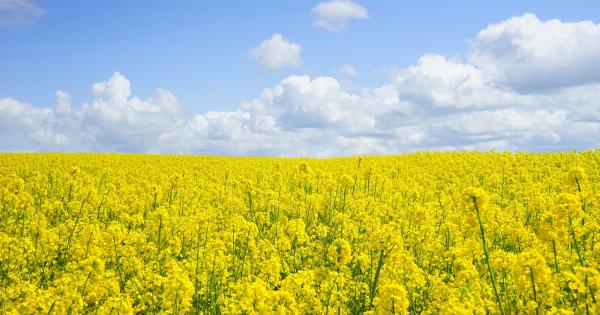Headaches are a common ailment that affects people of all ages. They can range from mild to severe and can interfere with your daily activities.
While there are several over-the-counter medications available to alleviate headache symptoms, many individuals prefer natural remedies due to their minimal side effects. In this article, we will explore some of the best herbal remedies to get rid of headaches.
1. Feverfew
Feverfew is a herb that has been used for centuries to treat headaches. It contains compounds that reduce inflammation, which is often a common cause of headaches. Feverfew can be taken in the form of capsules, powders, or a tea.
It is important to note that regular use of feverfew may take a few weeks to show significant improvement in headache symptoms.
2. Peppermint Oil
Peppermint oil is known for its soothing properties and can help alleviate tension headaches. When applied topically, it produces a cooling sensation that can provide instant relief.
To use peppermint oil, dilute a few drops in a carrier oil, such as coconut or almond oil, and gently massage it onto your temples or forehead. Alternatively, you can inhale the aroma of peppermint oil by adding a few drops to a diffuser or inhaling it directly from the bottle.
3. Ginger
Ginger has anti-inflammatory properties that can help relieve migraines and tension headaches. It blocks prostaglandins, which are chemicals that promote muscle contractions and inflammation in blood vessels.
Ginger can be consumed in various forms, such as ginger tea, capsules, or simply adding fresh ginger to your meals. It is recommended to start with a small amount of ginger and gradually increase the dosage to avoid any potential stomach irritation.
4. Willow Bark
Willow bark is a natural pain reliever that has been used for centuries to treat headaches and migraines. It contains a compound called salicin, which is similar to the active ingredient found in aspirin.
Willow bark can be consumed as a tea or taken in the form of capsules. It is important to consult with a healthcare professional before using willow bark, especially if you have any underlying medical conditions or are taking medications.
5. Lavender
Lavender is known for its calming and relaxing properties, making it an effective remedy for headaches caused by stress and anxiety. You can inhale the aroma of lavender essential oil by adding a few drops to a diffuser or inhaling it directly.
Alternatively, you can apply diluted lavender oil to your temples, forehead, or the back of your neck for quick relief. Lavender can also be consumed as a tea to promote relaxation.
6. Butterbur
Butterbur is a herb that has been used for centuries to treat migraines and reduce inflammation. It works by inhibiting the production of chemicals that cause blood vessel dilation. Butterbur supplements are available in capsule or tablet form.
It is important to choose a product that is labeled as “PA-free,” as some butterbur products may contain harmful compounds called pyrrolizidine alkaloids.
7. Valerian Root
Valerian root is commonly used as a natural remedy for anxiety and insomnia, but it can also be effective in treating headaches. It has muscle-relaxing properties that can help relieve tension headaches.
Valerian root can be consumed as a tea or taken in the form of capsules or tinctures. It is recommended to take valerian root before bedtime, as it may cause drowsiness.
8. Cayenne Pepper
Cayenne pepper contains a compound called capsaicin, which has pain-relieving properties. When applied topically, capsaicin blocks the nerve signals that transmit pain.
To use cayenne pepper for headaches, mix a small amount of cayenne pepper powder with warm water to form a paste. Apply the paste to your temples or the back of your neck for relief. Avoid applying cayenne pepper to broken or irritated skin.
9. Willowherb
Willowherb is a flowering herb that has been traditionally used to treat headaches and migraines. It contains compounds that have anti-inflammatory and analgesic properties. Willowherb can be consumed as a tea or taken in the form of capsules.
It is important to follow the recommended dosage and consult with a healthcare professional if you are pregnant, breastfeeding, or have any medical conditions.
10. Ginkgo Biloba
Ginkgo biloba is an herb that is often used to improve cognitive function and memory, but it can also help alleviate headaches. It improves blood circulation and reduces inflammation, which can contribute to headache relief.
Ginkgo biloba supplements are available in capsule form. It is important to choose a standardized extract that contains a specific concentration of active compounds.
While these herbal remedies can be effective in relieving headaches, it is important to note that everyone’s body reacts differently to different remedies.
It is always recommended to consult with a healthcare professional before trying any new herbal remedies, especially if you have any underlying medical conditions or are taking medications.






























